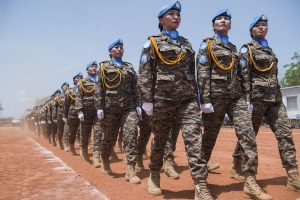This year marks the 20th anniversary of Mongolia’s first deployment with a United Nations peacekeeping mission. In a semi-celebratory move, the president of Mongolia, Khurelsukh Ukhnaa, initiated Mongolia’s first-ever international conference in support of U.N. Security Council Resolution 1325, “Women, Peace, and Security,” which “urges all actors to increase the participation of women and incorporate gender perspectives in all United Nations peace and security efforts.” While the conference was a salute to all female peacekeepers, it was also a shining moment for Mongolia’s military diplomacy.
In 2002, Mongolia’s parliament passed legislation allowing the military to deploy soldiers in international coalition operations. As a result, Mongolia first sent two separate unarmed military observers to U.N. missions, one in the Democratic Republic of Congo and the other in Western Sahara, in 2002. Since then, the Mongolian military has deployed contingent troops, military police, as well as humanitarian and medical staff to countries such as Sierra Leone, Liberia, Kosovo, Sudan, Iraq, and Afghanistan.
In 2019, the U.N. officially recognized Mongolia’s participation in humanitarian assistance, security, and medical services in parts of the world that desperately need additional support.
As Mongolia’s foreign policy pursues a multi-pillared approach, active participation in peacekeeping missions strengthens the country’s military diplomacy with multilateral organizations and defense ministries around the world.
During the Seoul U.N. Peacekeeping Ministerial meeting in 2021, Mongolia pledged to establish a Research Center on Peace Operations, increase female peacekeepers in U.N. missions, host an international conference, and equip units with renewable energy capacities.
The 2022 “Women, Peace, and Security” conference brought together female peacekeepers from 30 countries, including Mongolia, and 60 representatives and international researchers and scholars from the European Union and U.N. peacekeeping missions. At the conference, Under-Secretary-General for the U.N. Peace Operations Jean-Pierre Lacroix thanked all the female peacekeepers and emphasized Mongolia’s steadfast support of U.N. Peacekeeping operations over the past 20 years.
The conference aimed to support the implementation of the U.N. Security Council Resolution 1325, passed in 2000. The conference’s main objective was to create an environment for female peacekeepers to share their experiences, ideas, and challenges.
Mongolia’s first female brigadier general, Bolor Ganbold, who previously served in U.N. missions multiple times, has been vocal about the importance of limiting gender disparity in the Mongolian military as well as in U.N. peacekeeping missions. In response to the general’s perspective and in line with U.N. goals, Khurelsukh pledged to increase Mongolian female peacekeepers to 15 percent of the country’s military contingent by 2027. Although the U.N. quota remains far from met, the presidential commitment to achieve that goal should be recognized.
As Khurelsukh stated, “Mongolia has sent more than 20,000 military personnel to U.N. Peacekeeping and international military operations, and more than 900 of them are women. Mongolia ranked 20th in the number of women peacekeepers among the U.N. troop contributed countries.” According to Friedrich Ebert Stiftung and the Mongolian Institute for Innovative Policies, Mongolian female peacekeepers mainly participate in the United Nations Mission in South Sudan (38 percent of all Mongolia’s female PKOs) and the United Nations Mission in Liberia (27 percent).
Mongolia’s contribution to peacekeeping missions embodies the country’s commitment to global security and humanitarian assistance. As the Mongolian government continues to support multilateral efforts in defusing hostile situations and providing protection and security for the vulnerable, the country’s military diplomacy is diversified and strengthened at bilateral and multilateral level.
France, also a major U.N. peacekeeping contributor, has recognized Mongolia’s efforts. Ambassador of France to Mongolia Sebastien Surun, who attended the “Women, Peace, and Security” conference, stated, “France is proud to be partnering with Mongolia on an international level. It is right to recognize the Mongolian female peacekeeper’s contributions as part of Mongolia’s commitment to the U.N. Peacekeeping missions.”
Mongolia’s global partners have been supportive of Mongolia’s initiation to include more women in peacekeeping and in military.
The United States has been the largest support system for Mongolia’s participation in peacekeeping missions. In recent years, the U.S. has provided training and support for female military personnel. In 2019, 23 women from Mongolia enrolled in the Women’s Mentorship Program with the U.S. military, organized by the United States Indo-Pacific Command and the U.S. Army Pacific during Gobi Wolf Exercise.
From a foreign policy standpoint, the multi-faceted and multidimensional aspect of U.N. Peacekeeping operations is a force of engagement for Mongolia’s military diplomacy. The activities Mongolia engages in, including but not limited to U.N. Peacekeeping, Five Hills International Training, or its traditional military field training with its neighbors, strengthens Mongolia’s relations with multilateral organizations and defense ministries.

































